第一轮复习 七年级1-5
图片预览
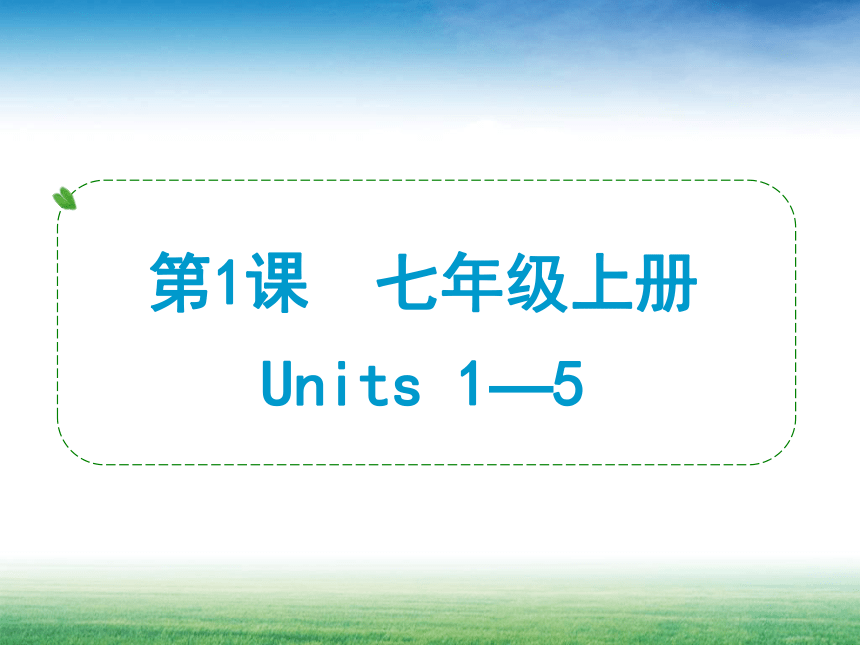
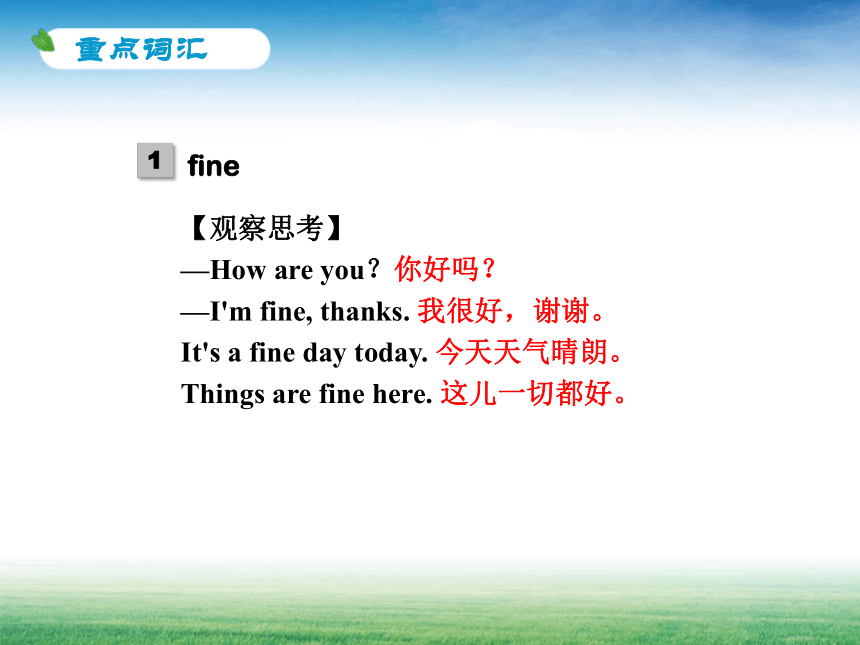
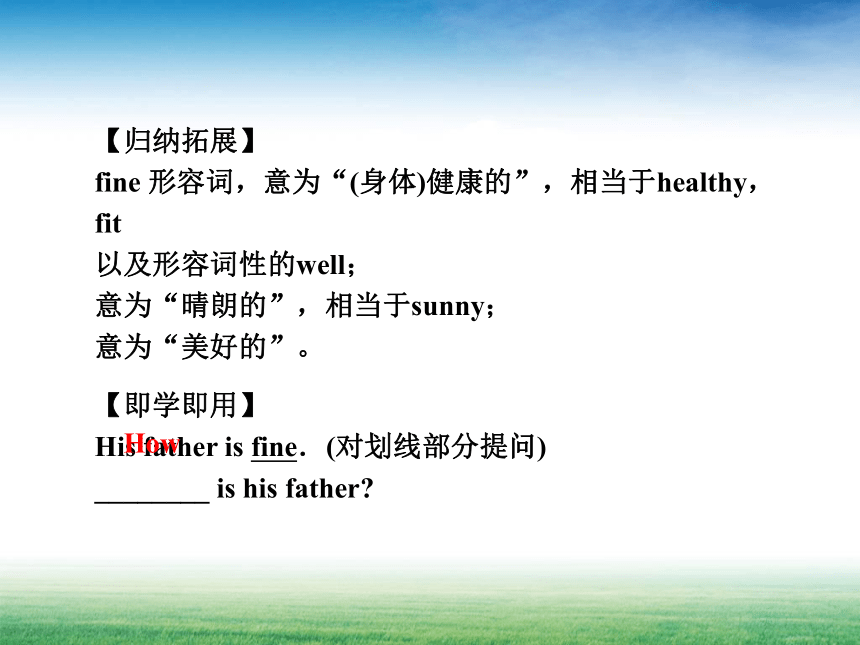
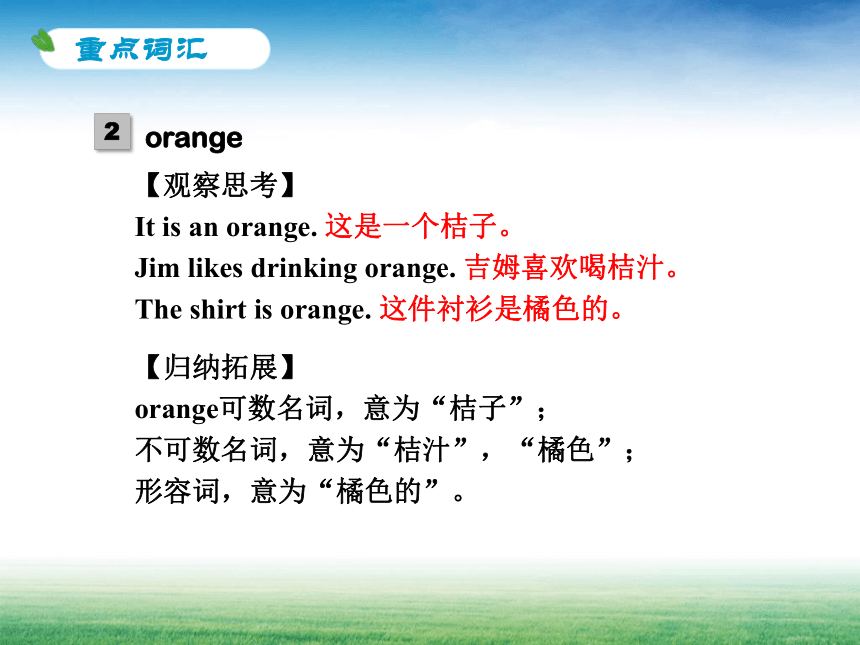
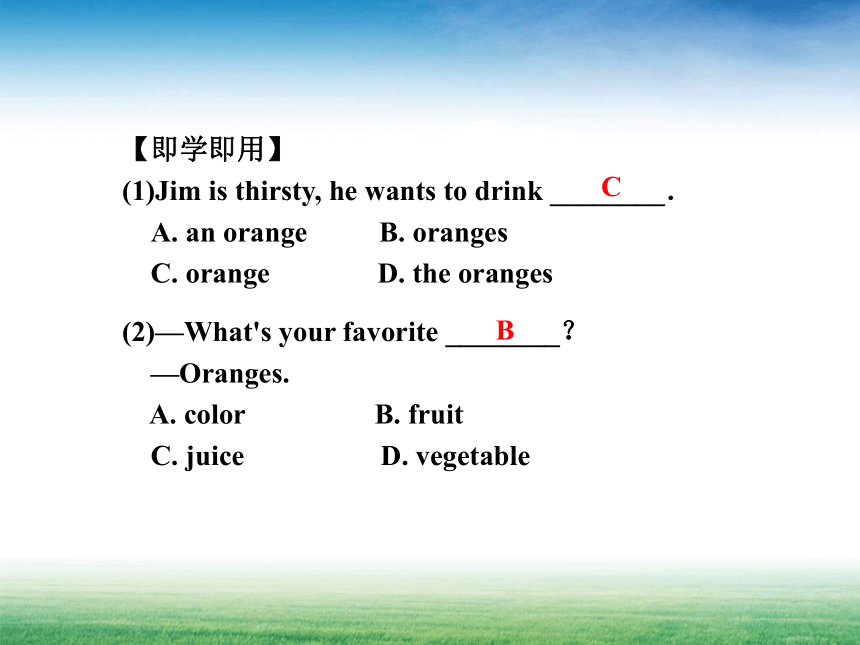
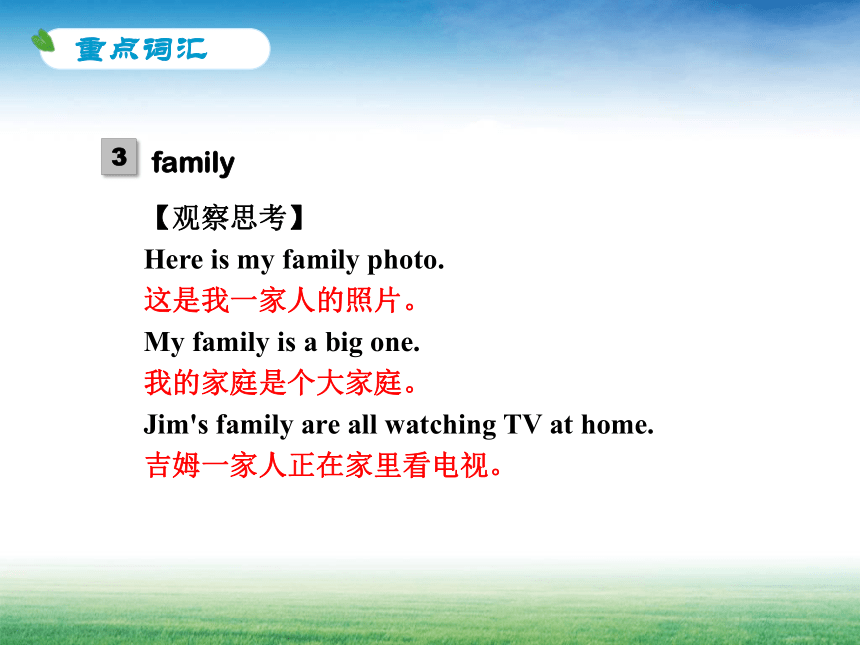
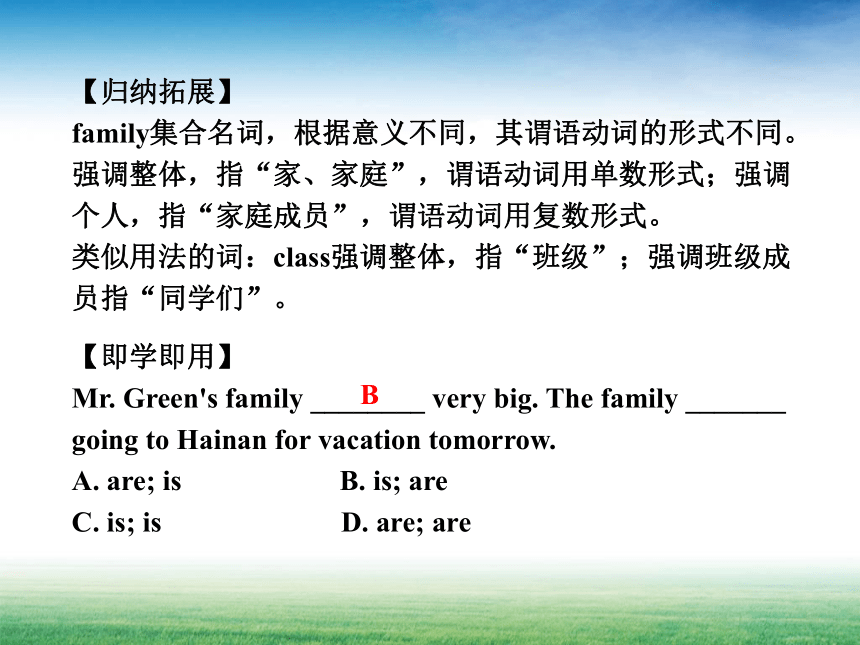
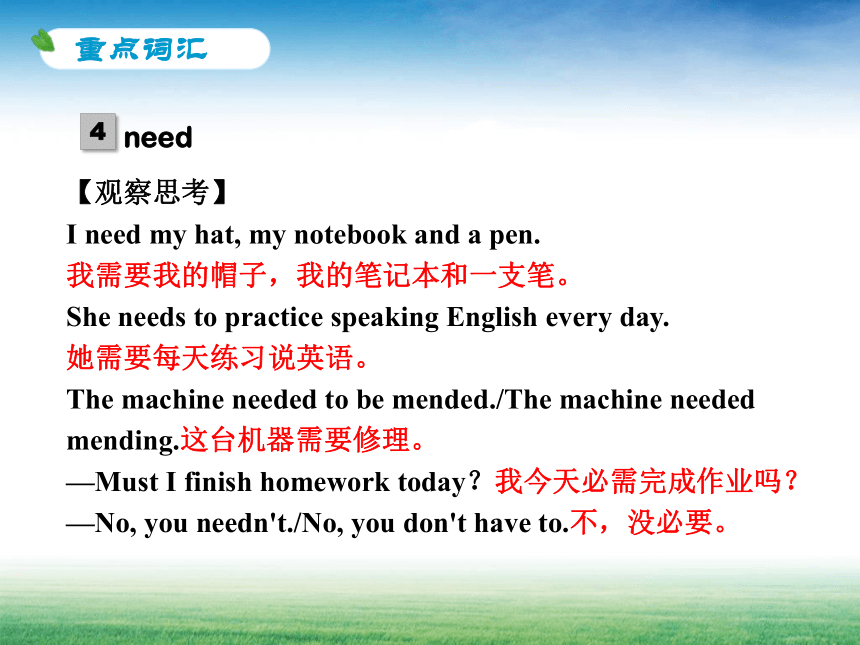
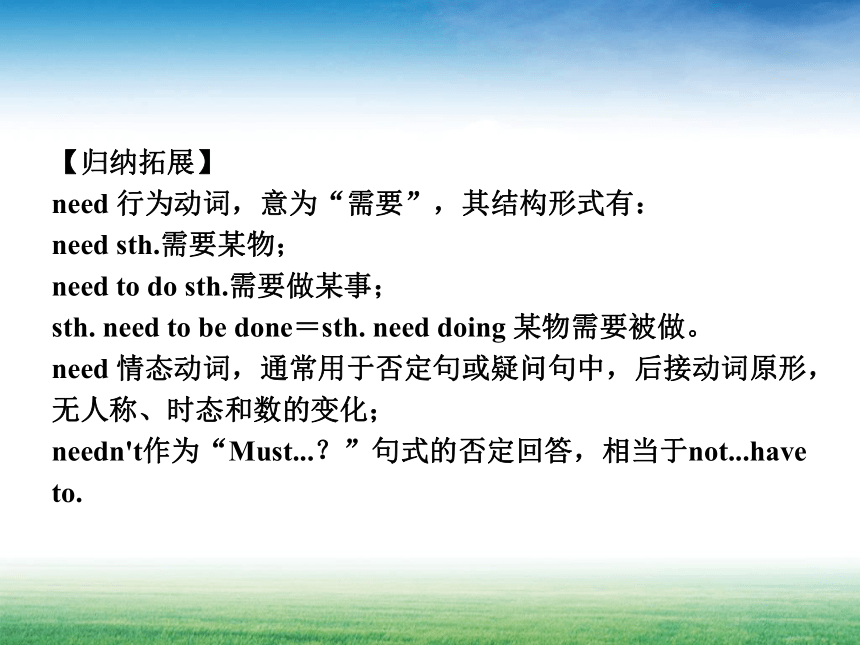
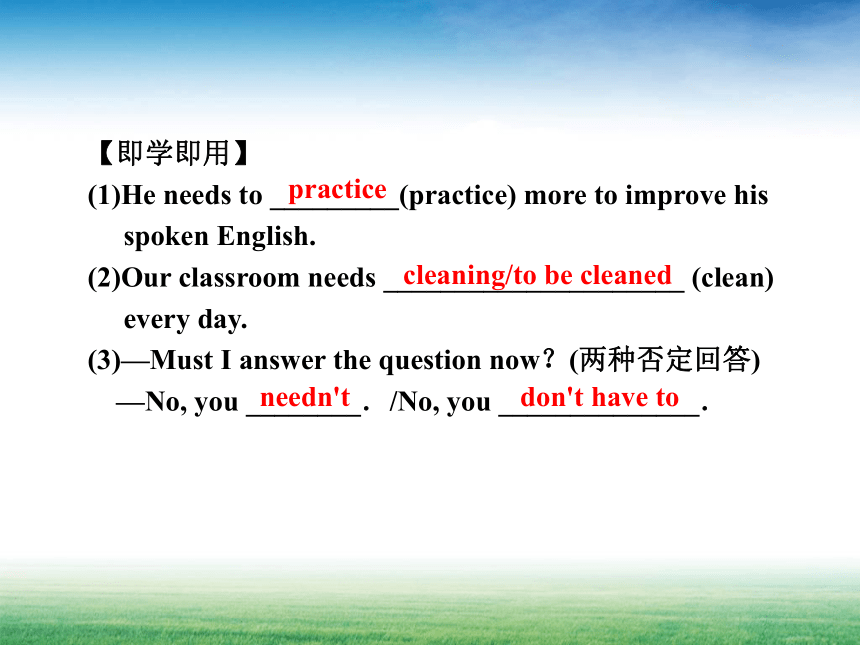
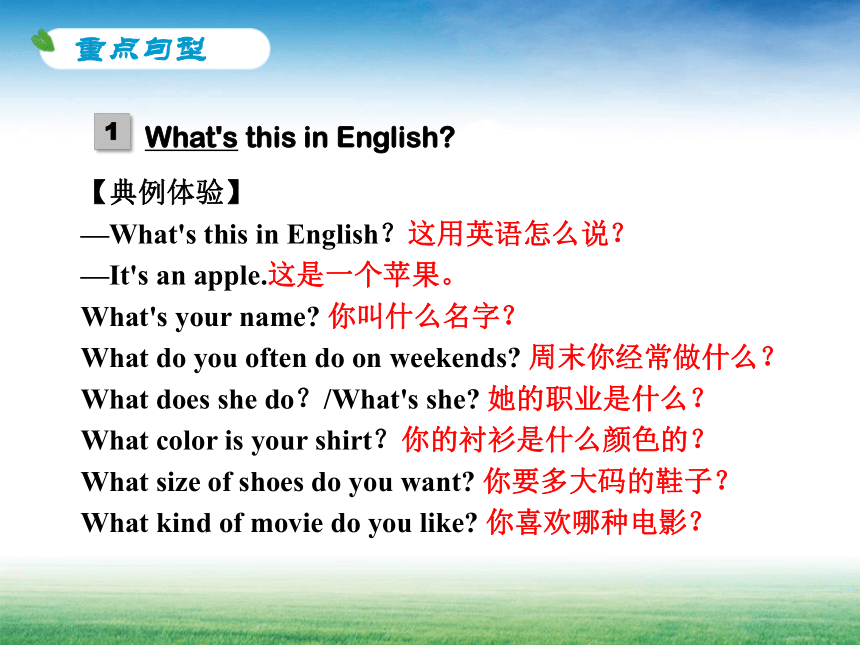
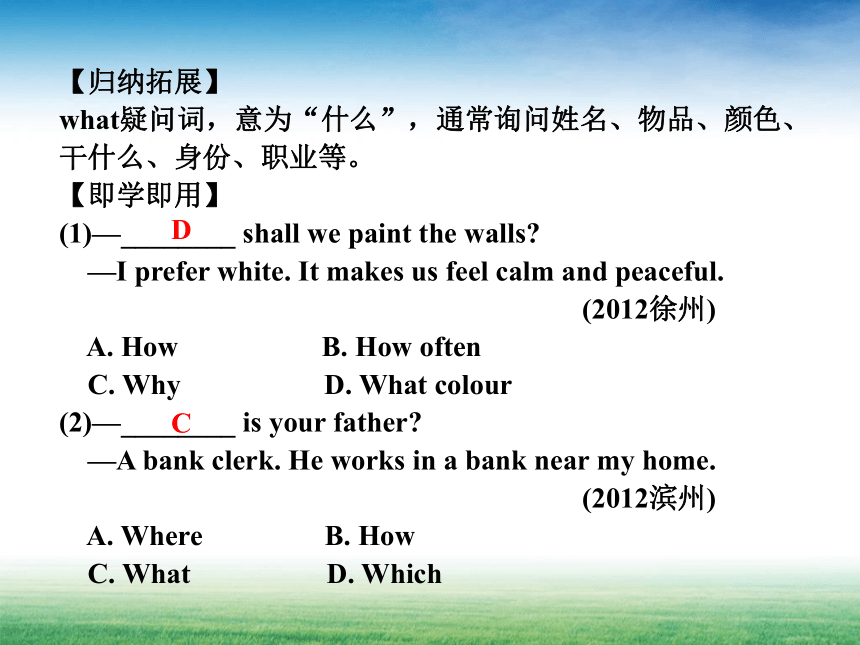
文档简介
课件53张PPT。第1课 七年级上册
Units 1—5重点词汇【观察思考】
—How are you?你好吗?
—I'm fine, thanks. 我很好,谢谢。
It's a fine day today. 今天天气晴朗。
Things are fine here. 这儿一切都好。【归纳拓展】
fine 形容词,意为“(身体)健康的”,相当于healthy,fit
以及形容词性的well;
意为“晴朗的”,相当于sunny;
意为“美好的”。
【即学即用】
His father is fine.(对划线部分提问)
________ is his father?How重点词汇【观察思考】
It is an orange. 这是一个桔子。
Jim likes drinking orange. 吉姆喜欢喝桔汁。
The shirt is orange. 这件衬衫是橘色的。
【归纳拓展】
orange可数名词,意为“桔子”;
不可数名词,意为“桔汁”,“橘色”;
形容词,意为“橘色的”。【即学即用】
(1)Jim is thirsty, he wants to drink ________.
A. an orange B. oranges
C. orange D. the oranges
(2)—What's your favorite ________?
—Oranges.
A. color B. fruit
C. juice D. vegetableCB重点词汇【观察思考】
Here is my family photo.
这是我一家人的照片。
My family is a big one.
我的家庭是个大家庭。
Jim's family are all watching TV at home.
吉姆一家人正在家里看电视。【归纳拓展】
family集合名词,根据意义不同,其谓语动词的形式不同。强调整体,指“家、家庭”,谓语动词用单数形式;强调个人,指“家庭成员”,谓语动词用复数形式。
类似用法的词:class强调整体,指“班级”;强调班级成员指“同学们”。
【即学即用】
Mr. Green's family ________ very big. The family _______ going to Hainan for vacation tomorrow.
A. are; is B. is; are
C. is; is D. are; areB重点词汇【观察思考】
I need my hat, my notebook and a pen.
我需要我的帽子,我的笔记本和一支笔。
She needs to practice speaking English every day.
她需要每天练习说英语。
The machine needed to be mended./The machine needed mending.这台机器需要修理。
—Must I finish homework today?我今天必需完成作业吗?
—No, you needn't./No, you don't have to.不,没必要。【归纳拓展】
need 行为动词,意为“需要”,其结构形式有:
need sth.需要某物;
need to do sth.需要做某事;
sth. need to be done=sth. need doing 某物需要被做。
need 情态动词,通常用于否定句或疑问句中,后接动词原形,无人称、时态和数的变化;
needn't作为“Must...?”句式的否定回答,相当于not...have to.【即学即用】
(1)He needs to _________(practice) more to improve his
spoken English.
(2)Our classroom needs _____________________ (clean)
every day.
(3)—Must I answer the question now?(两种否定回答)
—No, you ________./No, you ______________.practicecleaning/to be cleanedneedn'tdon't have to重点句型【典例体验】
—What's this in English?这用英语怎么说?
—It's an apple.这是一个苹果。
What's your name? 你叫什么名字?
What do you often do on weekends? 周末你经常做什么?
What does she do?/What's she? 她的职业是什么?
What color is your shirt?你的衬衫是什么颜色的?
What size of shoes do you want? 你要多大码的鞋子?
What kind of movie do you like? 你喜欢哪种电影?【归纳拓展】
what疑问词,意为“什么”,通常询问姓名、物品、颜色、
干什么、身份、职业等。
【即学即用】
(1)—________ shall we paint the walls?
—I prefer white. It makes us feel calm and peaceful.
(2012徐州)
A. How B. How often
C. Why D. What colour
(2)—________ is your father?
—A bank clerk. He works in a bank near my home.
(2012滨州)
A. Where B. How
C. What D. WhichDC重点句型【典例体验】
—Where are his keys? 他的钥匙在哪儿?
—They are on the chair. 在椅子上。
【归纳拓展】
where 疑问副词,意为“在哪儿”,询问地点。【即学即用】
(1)I can't remember ________ I put the book, and I need it
for my homework now.
A. where B. how
C. what D. why
(2)—Excuse me, could you tell me ________?
—In the supermarket. (2012湖州)
A. where I can buy this kind of CD player
B. where can I buy this kind of CD player
C. if I can buy this kind of CD player
D. if can I buy this kind of CD playerAA重点句型【典例体验】
Thanks for asking me.谢谢你的邀请。
The door of the classroom is broken.教室的门坏了。
【归纳拓展】
Thank you for 为……而感谢,后跟名词或动词的-ing形式。
of ……的,构成所有格形式,通常表示无生命的名词的“所
有”关系。
注意双重所有格的使用:a friend of Jim's吉姆的一个朋友。【即学即用】
(1)谢谢你上星期带我参观学校。
Thanks for ________ me around the school last week.
(2)我房间的门坏了。
___________________ is broken.
(3)我爸爸的一个朋友是老师。
_____________________ is a teacher.showingThe door of my roomA friend of my father's易混辨异【观察思考】
There is a backpack on the table. The backpack is John's.
桌上有一个背包,这个背包是约翰的。
An apple a day can keep you away from the doctor.
一天一个苹果可以让你远离医生。
【归纳拓展】
不定冠词a(an)通常用于泛指,意为“一个”,an 用于元音
发音开头的名词前;the通常用于特指,意为“这个(些)”。【即学即用】
(1)They want their daughter to go to ________ university,
but they also want her to get ________ summer job.
(2012 杭州)
A. 不填;a B. the; a
C. an; a D. a; the
(2)—There's ________ ball on the ground. Would you please
pass ________ ball to me?
—With pleasure. (2011扬州)
A. the; the B. the; a
C. a; a D. a; theAD(3)—Are you satisfied with the result of the exam?
—Not at all. I can’t have ________. (2011杭州)
A. a worse one B. a better one
C. the worse one D. the best oneA易混辨异【观察思考】
Please take these things to your brother.
请把这些东西带给你哥哥。
Waiter, please bring me a cup of water.
服务员,请给我一杯水。
Mom, can you get/fetch me something to eat?
妈妈,能给我一些吃的吗?
The box is too heavy. Can you help me to carry it?
这盒子太重了,你能帮我搬一下吗?【归纳拓展】
都是动词,且有“拿”和“带”的意思,但含义有所不同。
take意为“带走”,常与there连用,常用结构有take sb./sth.
to sp.,表示“带某人/某物去某地”;
bring意为“拿来”,常与here连用;
get意为“得到”;
carry意为“搬运”,不强调方向,带有负重的意思;
fetch表示“去拿”,强调来回。【即学即用】
(1)Don't forget to ________ your ID card here next time.
(2)The school bus ________ us to school every day.
(3)Please ________ some water for the young trees.
(4)It's polite to let the woman who is ________a baby have
your seat.bringtakesget/fetchcarrying易混辨异【观察思考】
She is a good singer, and she sings well.
她是一个好歌手,她唱得很好。
【归纳拓展】
good形容词,意为“好的”,修饰名词,或作表语。
well副词,意为“好地”,修饰动词,副词,形容词。
good 和well 的比较级和最高级都为better,best。
相关短语:be good at=do well in擅长于……,在……
方面干得好。【即学即用】
(1)This kind of skirt looks ________,and sells ________.
A. good; good B. well; good
C. good; well D. well; well
(2)She sang a song I believe I can fly in Yangzhou English
Classics Reading Contest. I have never heard a ________
voice than that before.(2012扬州)
A. good B. well
C. better D. bestCC易混辨异【观察思考】
We have many sports clubs.
我们有很多体育俱乐部。
We need much water.
我们需要很多的水。
There are a lot of/lots of people in the park.
公园里有很多人。
Thanks a lot. 多谢。
He is much more outgoing than me.
他比我要外向的多。【归纳拓展】
都有“许多,很多”之意。
many修饰可数名词的复数形式。
much修饰不可数名词;还可修饰比较级,意为“比……
得多”。
a lot of/lots of既可修饰可数名词复数,又可修饰不可数
名词,但常用于肯定句中。用法同plenty of。
a lot 修饰动词,意为“许多”。【即学即用】
(1)—There are too ________cars and trucks on the road.
Be careful when you go out.
—Don't worry. I'll look after myself.
A. many B. much
C. a lot D. a lot of
(2)—You are ________ more beautiful than before.
—Thank you.
A. much B. many
C. more D. lots ofAA(3)I've learned ________ that way.
A. many B. much
C. a lot D. a lot of
(4)A smile costs nothing, but gives so ________.
(2011杭州)
A. little B. few
C. many D. muchCD易混辨异【观察思考】
The old man looked at the board carefully, but he can't
see anything.
这个老人仔细地看着公告板,但他什么也看不到。
He likes playing sports, but he only watches them on TV.
他喜欢运动,但他只是在电视上看。
Reading in the sun is bad for our eyes.
在太阳下看书对眼睛不好。
He noticed a purse lying on the road.
他注意到地上有个钱包。【归纳拓展】
look不及物动词,意为“看着”, 强调看的动作,表示有意
识地集中精神去看,但并不一定能看见,多用来唤起别人
的注意。其后接宾语时,要加上介词at。
see及物动词,意为“看见”,强调看的结果,但不一定是有
意识地看。“看医生,看电影”也常用这个词。
watch及物动词,意为“观看”,指非常仔细地、有目的、集
中注意力地看。“看电视,看比赛”习惯上用这个词。
read及物动词,意为“读”,常用它来表达“看书,看报,看
信,看杂志, 看地图”等。
notice及物动词,意为“注意到”,指有意识的注意,含有从
无意注意到有意注意的变化。【即学即用】
(1)Last Saturday, Mr. Smiths ________ a wonderful
basketball match.
(2)I have never ________such an exciting film before.
(3)The teacher asked his students to ________ at the
picture carefully.
(4)Mr. Smith is ________the map of China.watchedseenlookreading易混辨异【观察思考】
Excuse me, is this your pen? 打扰了,这是你的钢笔吗?
I‘m sorry, I’m late. 对不起,我迟到了。
【归纳拓展】
Excuse me! 意为“打扰了!对不起!”,一般是为了与陌
生人搭话,或者要打断对方所说(做)的事。 excuse 可作
为名词,意为“借口”。
I'm sorry! 意为“对不起!”,表示道歉。【即学即用】
(1)—Don't draw on the blackboard, Dave.
—________,Mr. Zhang. I won't do it again.
A. OK B. Sure
C. Sorry D. Excuse me
(2)—Why didn't Sally play the violin at the concert last
night?
—She said that her hands hurt, but that was only a(n)
________. I saw her play tennis just now. (2012天津)
A. matter B. excuse
C. result D. expressionCB对点自测Ⅰ. 用方框中所给词的正确形式填空
need one orange fine take
1. January is the ________ month of the year.
2. It seems to rain. ________ your raincoat, Brian.
3. Of all the fruits, I like ________ best.
4. It's ________ weather, isn't it?
5. We ________ to do sports to keep healthy every day.firstTakeorangesfineneed对点自测Ⅱ. 单项选择
( )1. In order to find ________ better job, she planned
to learn ________ second foreign language.
(2012苏州)
A. the; a B. a; a
C. the; the D. a; the
解析:考查冠词。“一份较好的工作”和“一门第二外语”
都是泛指,含有“一”的意思。故选B。B( )2. —Hello, Jack. Haven't seen you for long. I'm
calling to check ________ you are.
—Very well. I'm glad you called. (2012丽水)
A. how B. what
C. where D. who
解析:考查连词。由答语“Very well很好”可知,询问
应是“how怎么样”。故选A。A对点自测( )3. There's enough time for you to go to the airport.
You ________ hurry now.
A. should B. needn't
C. must D. can't
解析:考查情态动词。根据前文“有足够的时间”可知
“你没必要匆匆忙忙”。故“needn't没必要”符合题意。B对点自测( )4. —For me, winter is the best season of a year!
—Me too. ________ if there's some snows. I like a
white world. (2012丽水)
A. Better B. Worse
C. Longer D. Shorter
解析:由下文“我喜欢白色的世界”可知“如果有雪是更好(better)”符合题意。故选A。A对点自测( )5. The students of Grade 7 visited Mike's farm and
saw many ________ there. (2012广东)
A. bird B. duck
C. sheep D. rabbit
解析:考查名词单、复数形式。many修饰可数名词复数
形式。A、B和D项都是单数形式,sheep绵羊的单、复数
一致。故选C。C对点自测( )6. —What a hot day!
—The weather report says it will be much ________
tomorrow.
A. hot B. hotter
C. hottest D. the hottest
解析:考查比较级。much修饰比较级。故选B。B对点自测( )7. —________ is your husband?
—A cook. He works in a restaurant near our house.
(2011绍兴)
A. What B. Where
C. How D. Which
解析:考查疑问副词。询问职业用“what is sb.?”。A对点自测( )8. Mr. Smith was ________ a newspaper when she
came in.
A. looking at B. reading
C. seeing D. watching
解析:考查动词辨析。看报纸用“read”。B对点自测( )9. —William, please remember to ________ the
photo taken in Canada here when you come to
school tomorrow. I'd like to have a look.
—OK. I'll introduce something about it to you
myself.
A. take B. pass
C. bring D. carry
解析:考查固定短语。与“here”搭配的动词为“bring”。C对点自测( )10. Mr. Yao does ________ in playing basketball, but
he is not ________ at talking with strangers.
A. good; well B. well; good
C. well; well D. good; good
解析:考查固定短语。表“擅长于……”的短语有:
do well in 或be good at。B对点自测( )11. —Mom, must I clean my room now?
—No, you ________. You can do it tomorrow.
(2012重庆)
A. can't B. needn't
C. mustn't D. shouldn't
解析:考查情态动词。“must...?”的否定回答,通常用
needn't。B对点自测( )12. Everyone can play an important part in society. As
members, we should try our best to do ________.
(2012黄石)
A. what we should do
B. what should we do
C. how we should do
D. how should we do
解析:查宾语从句。宾语从句须用陈述句语序,作为do的
宾语应用what。故选A。A对点自测写作训练启事的写作
常见的启事有遗失启事(Lost)、招领启事(Found)、征
文启事(Contributions)等。启事由标题、正文、签名等部
分组成。
一、启事的写作格式
1.将启事的要点作为标题(Lost, Found)写在正文上方
正中的位置;
2.发布启事的日期写在正文的右上方,也可以省略
不写;
3.署名位于正文下方。如果正文已经出现,也可以
省略不写。 二、写英文启事的注意事项
1.启事一般不用称呼和结束语,要求语言简明;
2.一般的启事正文都比较简短,通常包括what(物品及
其特征)、where(何处)、when(何时)、who(名字)、contact
(联系方式)、reward(相关酬谢等);
3.写招领启事,物品的具体特征不要写得过于详细,
以防有人冒领。 三、常用句型
1.I found... on my way home yesterday. 昨天在回家
的路上,我碰巧捡到……
2.A black wallet with some money in it was left in the
reading room on May 4.5月4日那天,一个装有一些钱的黑
色钱包被落在了阅览室。
3.There is /are ... in it. 里面有……
4.Please sent it to...请把它送给……
5.Please call Tom at 8856772. 请拨打8856772找Tom。四、写作模板
Lost
____________ (日期)
I was so careless that I lost ____________(遗失的物品)
____________ (遗失的地点)around ____________ (遗失的
时间). ____________ (失物的特征). ____________ (失物的
重要性). If you are the kind finder, could you do me a
favour to send it to ____________ (送还的地点) or ring me
up? I'll be very grateful for your kindness.
Loser, ____________ (署名)
Address: ____________(失主的地址)
Tel: ____________(失主的电话)Found
____________ (日期)
I happened to find ____________ (捡到的物品名称)on
the ____________(发现的地点). In the ____________ (捡到
的物品), there are ____________ (大体描述物品的种类、
特征). Please come to ____________ (认领地点) to take it
back.
Finder, ____________ (署名)
____________ (捡到者的单位或电话) 五、例文欣赏
假设你是八年(1)班的李勇,本月10日在本校食堂遗失手
提包一个,内有一些照片,小词典一本等,拾到者请交八年
(1)班班长或本人。
时间:2013年5月10日
Lost
May 10th, 2013
I'm from Class 1 Grade 8. I lost a bag in the dining room on the afternoon of May 10th. There are some photos, a small
dictionary and something else in it. Please send it to my
monitor or me. Many thanks to the finder.
Li Yong完成考点跟踪训练 1 课件53张PPT。第1课 七年级上册
Units 1—5重点词汇【观察思考】
—How are you?你好吗?
—I'm fine, thanks. 我很好,谢谢。
It's a fine day today. 今天天气晴朗。
Things are fine here. 这儿一切都好。【归纳拓展】
fine 形容词,意为“(身体)健康的”,相当于healthy,fit
以及形容词性的well;
意为“晴朗的”,相当于sunny;
意为“美好的”。
【即学即用】
His father is fine.(对划线部分提问)
________ is his father?How重点词汇【观察思考】
It is an orange. 这是一个桔子。
Jim likes drinking orange. 吉姆喜欢喝桔汁。
The shirt is orange. 这件衬衫是橘色的。
【归纳拓展】
orange可数名词,意为“桔子”;
不可数名词,意为“桔汁”,“橘色”;
形容词,意为“橘色的”。【即学即用】
(1)Jim is thirsty, he wants to drink ________.
A. an orange B. oranges
C. orange D. the oranges
(2)—What's your favorite ________?
—Oranges.
A. color B. fruit
C. juice D. vegetableCB重点词汇【观察思考】
Here is my family photo.
这是我一家人的照片。
My family is a big one.
我的家庭是个大家庭。
Jim's family are all watching TV at home.
吉姆一家人正在家里看电视。【归纳拓展】
family集合名词,根据意义不同,其谓语动词的形式不同。强调整体,指“家、家庭”,谓语动词用单数形式;强调个人,指“家庭成员”,谓语动词用复数形式。
类似用法的词:class强调整体,指“班级”;强调班级成员指“同学们”。
【即学即用】
Mr. Green's family ________ very big. The family _______ going to Hainan for vacation tomorrow.
A. are; is B. is; are
C. is; is D. are; areB重点词汇【观察思考】
I need my hat, my notebook and a pen.
我需要我的帽子,我的笔记本和一支笔。
She needs to practice speaking English every day.
她需要每天练习说英语。
The machine needed to be mended./The machine needed mending.这台机器需要修理。
—Must I finish homework today?我今天必需完成作业吗?
—No, you needn't./No, you don't have to.不,没必要。【归纳拓展】
need 行为动词,意为“需要”,其结构形式有:
need sth.需要某物;
need to do sth.需要做某事;
sth. need to be done=sth. need doing 某物需要被做。
need 情态动词,通常用于否定句或疑问句中,后接动词原形,无人称、时态和数的变化;
needn't作为“Must...?”句式的否定回答,相当于not...have to.【即学即用】
(1)He needs to _________(practice) more to improve his
spoken English.
(2)Our classroom needs _____________________ (clean)
every day.
(3)—Must I answer the question now?(两种否定回答)
—No, you ________./No, you ______________.practicecleaning/to be cleanedneedn'tdon't have to重点句型【典例体验】
—What's this in English?这用英语怎么说?
—It's an apple.这是一个苹果。
What's your name? 你叫什么名字?
What do you often do on weekends? 周末你经常做什么?
What does she do?/What's she? 她的职业是什么?
What color is your shirt?你的衬衫是什么颜色的?
What size of shoes do you want? 你要多大码的鞋子?
What kind of movie do you like? 你喜欢哪种电影?【归纳拓展】
what疑问词,意为“什么”,通常询问姓名、物品、颜色、
干什么、身份、职业等。
【即学即用】
(1)—________ shall we paint the walls?
—I prefer white. It makes us feel calm and peaceful.
(2012徐州)
A. How B. How often
C. Why D. What colour
(2)—________ is your father?
—A bank clerk. He works in a bank near my home.
(2012滨州)
A. Where B. How
C. What D. WhichDC重点句型【典例体验】
—Where are his keys? 他的钥匙在哪儿?
—They are on the chair. 在椅子上。
【归纳拓展】
where 疑问副词,意为“在哪儿”,询问地点。【即学即用】
(1)I can't remember ________ I put the book, and I need it
for my homework now.
A. where B. how
C. what D. why
(2)—Excuse me, could you tell me ________?
—In the supermarket. (2012湖州)
A. where I can buy this kind of CD player
B. where can I buy this kind of CD player
C. if I can buy this kind of CD player
D. if can I buy this kind of CD playerAA重点句型【典例体验】
Thanks for asking me.谢谢你的邀请。
The door of the classroom is broken.教室的门坏了。
【归纳拓展】
Thank you for 为……而感谢,后跟名词或动词的-ing形式。
of ……的,构成所有格形式,通常表示无生命的名词的“所
有”关系。
注意双重所有格的使用:a friend of Jim's吉姆的一个朋友。【即学即用】
(1)谢谢你上星期带我参观学校。
Thanks for ________ me around the school last week.
(2)我房间的门坏了。
___________________ is broken.
(3)我爸爸的一个朋友是老师。
_____________________ is a teacher.showingThe door of my roomA friend of my father's易混辨异【观察思考】
There is a backpack on the table. The backpack is John's.
桌上有一个背包,这个背包是约翰的。
An apple a day can keep you away from the doctor.
一天一个苹果可以让你远离医生。
【归纳拓展】
不定冠词a(an)通常用于泛指,意为“一个”,an 用于元音
发音开头的名词前;the通常用于特指,意为“这个(些)”。【即学即用】
(1)They want their daughter to go to ________ university,
but they also want her to get ________ summer job.
(2012 杭州)
A. 不填;a B. the; a
C. an; a D. a; the
(2)—There's ________ ball on the ground. Would you please
pass ________ ball to me?
—With pleasure. (2011扬州)
A. the; the B. the; a
C. a; a D. a; theAD(3)—Are you satisfied with the result of the exam?
—Not at all. I can’t have ________. (2011杭州)
A. a worse one B. a better one
C. the worse one D. the best oneA易混辨异【观察思考】
Please take these things to your brother.
请把这些东西带给你哥哥。
Waiter, please bring me a cup of water.
服务员,请给我一杯水。
Mom, can you get/fetch me something to eat?
妈妈,能给我一些吃的吗?
The box is too heavy. Can you help me to carry it?
这盒子太重了,你能帮我搬一下吗?【归纳拓展】
都是动词,且有“拿”和“带”的意思,但含义有所不同。
take意为“带走”,常与there连用,常用结构有take sb./sth.
to sp.,表示“带某人/某物去某地”;
bring意为“拿来”,常与here连用;
get意为“得到”;
carry意为“搬运”,不强调方向,带有负重的意思;
fetch表示“去拿”,强调来回。【即学即用】
(1)Don't forget to ________ your ID card here next time.
(2)The school bus ________ us to school every day.
(3)Please ________ some water for the young trees.
(4)It's polite to let the woman who is ________a baby have
your seat.bringtakesget/fetchcarrying易混辨异【观察思考】
She is a good singer, and she sings well.
她是一个好歌手,她唱得很好。
【归纳拓展】
good形容词,意为“好的”,修饰名词,或作表语。
well副词,意为“好地”,修饰动词,副词,形容词。
good 和well 的比较级和最高级都为better,best。
相关短语:be good at=do well in擅长于……,在……
方面干得好。【即学即用】
(1)This kind of skirt looks ________,and sells ________.
A. good; good B. well; good
C. good; well D. well; well
(2)She sang a song I believe I can fly in Yangzhou English
Classics Reading Contest. I have never heard a ________
voice than that before.(2012扬州)
A. good B. well
C. better D. bestCC易混辨异【观察思考】
We have many sports clubs.
我们有很多体育俱乐部。
We need much water.
我们需要很多的水。
There are a lot of/lots of people in the park.
公园里有很多人。
Thanks a lot. 多谢。
He is much more outgoing than me.
他比我要外向的多。【归纳拓展】
都有“许多,很多”之意。
many修饰可数名词的复数形式。
much修饰不可数名词;还可修饰比较级,意为“比……
得多”。
a lot of/lots of既可修饰可数名词复数,又可修饰不可数
名词,但常用于肯定句中。用法同plenty of。
a lot 修饰动词,意为“许多”。【即学即用】
(1)—There are too ________cars and trucks on the road.
Be careful when you go out.
—Don't worry. I'll look after myself.
A. many B. much
C. a lot D. a lot of
(2)—You are ________ more beautiful than before.
—Thank you.
A. much B. many
C. more D. lots ofAA(3)I've learned ________ that way.
A. many B. much
C. a lot D. a lot of
(4)A smile costs nothing, but gives so ________.
(2011杭州)
A. little B. few
C. many D. muchCD易混辨异【观察思考】
The old man looked at the board carefully, but he can't
see anything.
这个老人仔细地看着公告板,但他什么也看不到。
He likes playing sports, but he only watches them on TV.
他喜欢运动,但他只是在电视上看。
Reading in the sun is bad for our eyes.
在太阳下看书对眼睛不好。
He noticed a purse lying on the road.
他注意到地上有个钱包。【归纳拓展】
look不及物动词,意为“看着”, 强调看的动作,表示有意
识地集中精神去看,但并不一定能看见,多用来唤起别人
的注意。其后接宾语时,要加上介词at。
see及物动词,意为“看见”,强调看的结果,但不一定是有
意识地看。“看医生,看电影”也常用这个词。
watch及物动词,意为“观看”,指非常仔细地、有目的、集
中注意力地看。“看电视,看比赛”习惯上用这个词。
read及物动词,意为“读”,常用它来表达“看书,看报,看
信,看杂志, 看地图”等。
notice及物动词,意为“注意到”,指有意识的注意,含有从
无意注意到有意注意的变化。【即学即用】
(1)Last Saturday, Mr. Smiths ________ a wonderful
basketball match.
(2)I have never ________such an exciting film before.
(3)The teacher asked his students to ________ at the
picture carefully.
(4)Mr. Smith is ________the map of China.watchedseenlookreading易混辨异【观察思考】
Excuse me, is this your pen? 打扰了,这是你的钢笔吗?
I‘m sorry, I’m late. 对不起,我迟到了。
【归纳拓展】
Excuse me! 意为“打扰了!对不起!”,一般是为了与陌
生人搭话,或者要打断对方所说(做)的事。 excuse 可作
为名词,意为“借口”。
I'm sorry! 意为“对不起!”,表示道歉。【即学即用】
(1)—Don't draw on the blackboard, Dave.
—________,Mr. Zhang. I won't do it again.
A. OK B. Sure
C. Sorry D. Excuse me
(2)—Why didn't Sally play the violin at the concert last
night?
—She said that her hands hurt, but that was only a(n)
________. I saw her play tennis just now. (2012天津)
A. matter B. excuse
C. result D. expressionCB对点自测Ⅰ. 用方框中所给词的正确形式填空
need one orange fine take
1. January is the ________ month of the year.
2. It seems to rain. ________ your raincoat, Brian.
3. Of all the fruits, I like ________ best.
4. It's ________ weather, isn't it?
5. We ________ to do sports to keep healthy every day.firstTakeorangesfineneed对点自测Ⅱ. 单项选择
( )1. In order to find ________ better job, she planned
to learn ________ second foreign language.
(2012苏州)
A. the; a B. a; a
C. the; the D. a; the
解析:考查冠词。“一份较好的工作”和“一门第二外语”
都是泛指,含有“一”的意思。故选B。B( )2. —Hello, Jack. Haven't seen you for long. I'm
calling to check ________ you are.
—Very well. I'm glad you called. (2012丽水)
A. how B. what
C. where D. who
解析:考查连词。由答语“Very well很好”可知,询问
应是“how怎么样”。故选A。A对点自测( )3. There's enough time for you to go to the airport.
You ________ hurry now.
A. should B. needn't
C. must D. can't
解析:考查情态动词。根据前文“有足够的时间”可知
“你没必要匆匆忙忙”。故“needn't没必要”符合题意。B对点自测( )4. —For me, winter is the best season of a year!
—Me too. ________ if there's some snows. I like a
white world. (2012丽水)
A. Better B. Worse
C. Longer D. Shorter
解析:由下文“我喜欢白色的世界”可知“如果有雪是更好(better)”符合题意。故选A。A对点自测( )5. The students of Grade 7 visited Mike's farm and
saw many ________ there. (2012广东)
A. bird B. duck
C. sheep D. rabbit
解析:考查名词单、复数形式。many修饰可数名词复数
形式。A、B和D项都是单数形式,sheep绵羊的单、复数
一致。故选C。C对点自测( )6. —What a hot day!
—The weather report says it will be much ________
tomorrow.
A. hot B. hotter
C. hottest D. the hottest
解析:考查比较级。much修饰比较级。故选B。B对点自测( )7. —________ is your husband?
—A cook. He works in a restaurant near our house.
(2011绍兴)
A. What B. Where
C. How D. Which
解析:考查疑问副词。询问职业用“what is sb.?”。A对点自测( )8. Mr. Smith was ________ a newspaper when she
came in.
A. looking at B. reading
C. seeing D. watching
解析:考查动词辨析。看报纸用“read”。B对点自测( )9. —William, please remember to ________ the
photo taken in Canada here when you come to
school tomorrow. I'd like to have a look.
—OK. I'll introduce something about it to you
myself.
A. take B. pass
C. bring D. carry
解析:考查固定短语。与“here”搭配的动词为“bring”。C对点自测( )10. Mr. Yao does ________ in playing basketball, but
he is not ________ at talking with strangers.
A. good; well B. well; good
C. well; well D. good; good
解析:考查固定短语。表“擅长于……”的短语有:
do well in 或be good at。B对点自测( )11. —Mom, must I clean my room now?
—No, you ________. You can do it tomorrow.
(2012重庆)
A. can't B. needn't
C. mustn't D. shouldn't
解析:考查情态动词。“must...?”的否定回答,通常用
needn't。B对点自测( )12. Everyone can play an important part in society. As
members, we should try our best to do ________.
(2012黄石)
A. what we should do
B. what should we do
C. how we should do
D. how should we do
解析:查宾语从句。宾语从句须用陈述句语序,作为do的
宾语应用what。故选A。A对点自测写作训练启事的写作
常见的启事有遗失启事(Lost)、招领启事(Found)、征
文启事(Contributions)等。启事由标题、正文、签名等部
分组成。
一、启事的写作格式
1.将启事的要点作为标题(Lost, Found)写在正文上方
正中的位置;
2.发布启事的日期写在正文的右上方,也可以省略
不写;
3.署名位于正文下方。如果正文已经出现,也可以
省略不写。 二、写英文启事的注意事项
1.启事一般不用称呼和结束语,要求语言简明;
2.一般的启事正文都比较简短,通常包括what(物品及
其特征)、where(何处)、when(何时)、who(名字)、contact
(联系方式)、reward(相关酬谢等);
3.写招领启事,物品的具体特征不要写得过于详细,
以防有人冒领。 三、常用句型
1.I found... on my way home yesterday. 昨天在回家
的路上,我碰巧捡到……
2.A black wallet with some money in it was left in the
reading room on May 4.5月4日那天,一个装有一些钱的黑
色钱包被落在了阅览室。
3.There is /are ... in it. 里面有……
4.Please sent it to...请把它送给……
5.Please call Tom at 8856772. 请拨打8856772找Tom。四、写作模板
Lost
____________ (日期)
I was so careless that I lost ____________(遗失的物品)
____________ (遗失的地点)around ____________ (遗失的
时间). ____________ (失物的特征). ____________ (失物的
重要性). If you are the kind finder, could you do me a
favour to send it to ____________ (送还的地点) or ring me
up? I'll be very grateful for your kindness.
Loser, ____________ (署名)
Address: ____________(失主的地址)
Tel: ____________(失主的电话)Found
____________ (日期)
I happened to find ____________ (捡到的物品名称)on
the ____________(发现的地点). In the ____________ (捡到
的物品), there are ____________ (大体描述物品的种类、
特征). Please come to ____________ (认领地点) to take it
back.
Finder, ____________ (署名)
____________ (捡到者的单位或电话) 五、例文欣赏
假设你是八年(1)班的李勇,本月10日在本校食堂遗失手
提包一个,内有一些照片,小词典一本等,拾到者请交八年
(1)班班长或本人。
时间:2013年5月10日
Lost
May 10th, 2013
I'm from Class 1 Grade 8. I lost a bag in the dining room on the afternoon of May 10th. There are some photos, a small
dictionary and something else in it. Please send it to my
monitor or me. Many thanks to the finder.
Li Yong完成考点跟踪训练 1
Units 1—5重点词汇【观察思考】
—How are you?你好吗?
—I'm fine, thanks. 我很好,谢谢。
It's a fine day today. 今天天气晴朗。
Things are fine here. 这儿一切都好。【归纳拓展】
fine 形容词,意为“(身体)健康的”,相当于healthy,fit
以及形容词性的well;
意为“晴朗的”,相当于sunny;
意为“美好的”。
【即学即用】
His father is fine.(对划线部分提问)
________ is his father?How重点词汇【观察思考】
It is an orange. 这是一个桔子。
Jim likes drinking orange. 吉姆喜欢喝桔汁。
The shirt is orange. 这件衬衫是橘色的。
【归纳拓展】
orange可数名词,意为“桔子”;
不可数名词,意为“桔汁”,“橘色”;
形容词,意为“橘色的”。【即学即用】
(1)Jim is thirsty, he wants to drink ________.
A. an orange B. oranges
C. orange D. the oranges
(2)—What's your favorite ________?
—Oranges.
A. color B. fruit
C. juice D. vegetableCB重点词汇【观察思考】
Here is my family photo.
这是我一家人的照片。
My family is a big one.
我的家庭是个大家庭。
Jim's family are all watching TV at home.
吉姆一家人正在家里看电视。【归纳拓展】
family集合名词,根据意义不同,其谓语动词的形式不同。强调整体,指“家、家庭”,谓语动词用单数形式;强调个人,指“家庭成员”,谓语动词用复数形式。
类似用法的词:class强调整体,指“班级”;强调班级成员指“同学们”。
【即学即用】
Mr. Green's family ________ very big. The family _______ going to Hainan for vacation tomorrow.
A. are; is B. is; are
C. is; is D. are; areB重点词汇【观察思考】
I need my hat, my notebook and a pen.
我需要我的帽子,我的笔记本和一支笔。
She needs to practice speaking English every day.
她需要每天练习说英语。
The machine needed to be mended./The machine needed mending.这台机器需要修理。
—Must I finish homework today?我今天必需完成作业吗?
—No, you needn't./No, you don't have to.不,没必要。【归纳拓展】
need 行为动词,意为“需要”,其结构形式有:
need sth.需要某物;
need to do sth.需要做某事;
sth. need to be done=sth. need doing 某物需要被做。
need 情态动词,通常用于否定句或疑问句中,后接动词原形,无人称、时态和数的变化;
needn't作为“Must...?”句式的否定回答,相当于not...have to.【即学即用】
(1)He needs to _________(practice) more to improve his
spoken English.
(2)Our classroom needs _____________________ (clean)
every day.
(3)—Must I answer the question now?(两种否定回答)
—No, you ________./No, you ______________.practicecleaning/to be cleanedneedn'tdon't have to重点句型【典例体验】
—What's this in English?这用英语怎么说?
—It's an apple.这是一个苹果。
What's your name? 你叫什么名字?
What do you often do on weekends? 周末你经常做什么?
What does she do?/What's she? 她的职业是什么?
What color is your shirt?你的衬衫是什么颜色的?
What size of shoes do you want? 你要多大码的鞋子?
What kind of movie do you like? 你喜欢哪种电影?【归纳拓展】
what疑问词,意为“什么”,通常询问姓名、物品、颜色、
干什么、身份、职业等。
【即学即用】
(1)—________ shall we paint the walls?
—I prefer white. It makes us feel calm and peaceful.
(2012徐州)
A. How B. How often
C. Why D. What colour
(2)—________ is your father?
—A bank clerk. He works in a bank near my home.
(2012滨州)
A. Where B. How
C. What D. WhichDC重点句型【典例体验】
—Where are his keys? 他的钥匙在哪儿?
—They are on the chair. 在椅子上。
【归纳拓展】
where 疑问副词,意为“在哪儿”,询问地点。【即学即用】
(1)I can't remember ________ I put the book, and I need it
for my homework now.
A. where B. how
C. what D. why
(2)—Excuse me, could you tell me ________?
—In the supermarket. (2012湖州)
A. where I can buy this kind of CD player
B. where can I buy this kind of CD player
C. if I can buy this kind of CD player
D. if can I buy this kind of CD playerAA重点句型【典例体验】
Thanks for asking me.谢谢你的邀请。
The door of the classroom is broken.教室的门坏了。
【归纳拓展】
Thank you for 为……而感谢,后跟名词或动词的-ing形式。
of ……的,构成所有格形式,通常表示无生命的名词的“所
有”关系。
注意双重所有格的使用:a friend of Jim's吉姆的一个朋友。【即学即用】
(1)谢谢你上星期带我参观学校。
Thanks for ________ me around the school last week.
(2)我房间的门坏了。
___________________ is broken.
(3)我爸爸的一个朋友是老师。
_____________________ is a teacher.showingThe door of my roomA friend of my father's易混辨异【观察思考】
There is a backpack on the table. The backpack is John's.
桌上有一个背包,这个背包是约翰的。
An apple a day can keep you away from the doctor.
一天一个苹果可以让你远离医生。
【归纳拓展】
不定冠词a(an)通常用于泛指,意为“一个”,an 用于元音
发音开头的名词前;the通常用于特指,意为“这个(些)”。【即学即用】
(1)They want their daughter to go to ________ university,
but they also want her to get ________ summer job.
(2012 杭州)
A. 不填;a B. the; a
C. an; a D. a; the
(2)—There's ________ ball on the ground. Would you please
pass ________ ball to me?
—With pleasure. (2011扬州)
A. the; the B. the; a
C. a; a D. a; theAD(3)—Are you satisfied with the result of the exam?
—Not at all. I can’t have ________. (2011杭州)
A. a worse one B. a better one
C. the worse one D. the best oneA易混辨异【观察思考】
Please take these things to your brother.
请把这些东西带给你哥哥。
Waiter, please bring me a cup of water.
服务员,请给我一杯水。
Mom, can you get/fetch me something to eat?
妈妈,能给我一些吃的吗?
The box is too heavy. Can you help me to carry it?
这盒子太重了,你能帮我搬一下吗?【归纳拓展】
都是动词,且有“拿”和“带”的意思,但含义有所不同。
take意为“带走”,常与there连用,常用结构有take sb./sth.
to sp.,表示“带某人/某物去某地”;
bring意为“拿来”,常与here连用;
get意为“得到”;
carry意为“搬运”,不强调方向,带有负重的意思;
fetch表示“去拿”,强调来回。【即学即用】
(1)Don't forget to ________ your ID card here next time.
(2)The school bus ________ us to school every day.
(3)Please ________ some water for the young trees.
(4)It's polite to let the woman who is ________a baby have
your seat.bringtakesget/fetchcarrying易混辨异【观察思考】
She is a good singer, and she sings well.
她是一个好歌手,她唱得很好。
【归纳拓展】
good形容词,意为“好的”,修饰名词,或作表语。
well副词,意为“好地”,修饰动词,副词,形容词。
good 和well 的比较级和最高级都为better,best。
相关短语:be good at=do well in擅长于……,在……
方面干得好。【即学即用】
(1)This kind of skirt looks ________,and sells ________.
A. good; good B. well; good
C. good; well D. well; well
(2)She sang a song I believe I can fly in Yangzhou English
Classics Reading Contest. I have never heard a ________
voice than that before.(2012扬州)
A. good B. well
C. better D. bestCC易混辨异【观察思考】
We have many sports clubs.
我们有很多体育俱乐部。
We need much water.
我们需要很多的水。
There are a lot of/lots of people in the park.
公园里有很多人。
Thanks a lot. 多谢。
He is much more outgoing than me.
他比我要外向的多。【归纳拓展】
都有“许多,很多”之意。
many修饰可数名词的复数形式。
much修饰不可数名词;还可修饰比较级,意为“比……
得多”。
a lot of/lots of既可修饰可数名词复数,又可修饰不可数
名词,但常用于肯定句中。用法同plenty of。
a lot 修饰动词,意为“许多”。【即学即用】
(1)—There are too ________cars and trucks on the road.
Be careful when you go out.
—Don't worry. I'll look after myself.
A. many B. much
C. a lot D. a lot of
(2)—You are ________ more beautiful than before.
—Thank you.
A. much B. many
C. more D. lots ofAA(3)I've learned ________ that way.
A. many B. much
C. a lot D. a lot of
(4)A smile costs nothing, but gives so ________.
(2011杭州)
A. little B. few
C. many D. muchCD易混辨异【观察思考】
The old man looked at the board carefully, but he can't
see anything.
这个老人仔细地看着公告板,但他什么也看不到。
He likes playing sports, but he only watches them on TV.
他喜欢运动,但他只是在电视上看。
Reading in the sun is bad for our eyes.
在太阳下看书对眼睛不好。
He noticed a purse lying on the road.
他注意到地上有个钱包。【归纳拓展】
look不及物动词,意为“看着”, 强调看的动作,表示有意
识地集中精神去看,但并不一定能看见,多用来唤起别人
的注意。其后接宾语时,要加上介词at。
see及物动词,意为“看见”,强调看的结果,但不一定是有
意识地看。“看医生,看电影”也常用这个词。
watch及物动词,意为“观看”,指非常仔细地、有目的、集
中注意力地看。“看电视,看比赛”习惯上用这个词。
read及物动词,意为“读”,常用它来表达“看书,看报,看
信,看杂志, 看地图”等。
notice及物动词,意为“注意到”,指有意识的注意,含有从
无意注意到有意注意的变化。【即学即用】
(1)Last Saturday, Mr. Smiths ________ a wonderful
basketball match.
(2)I have never ________such an exciting film before.
(3)The teacher asked his students to ________ at the
picture carefully.
(4)Mr. Smith is ________the map of China.watchedseenlookreading易混辨异【观察思考】
Excuse me, is this your pen? 打扰了,这是你的钢笔吗?
I‘m sorry, I’m late. 对不起,我迟到了。
【归纳拓展】
Excuse me! 意为“打扰了!对不起!”,一般是为了与陌
生人搭话,或者要打断对方所说(做)的事。 excuse 可作
为名词,意为“借口”。
I'm sorry! 意为“对不起!”,表示道歉。【即学即用】
(1)—Don't draw on the blackboard, Dave.
—________,Mr. Zhang. I won't do it again.
A. OK B. Sure
C. Sorry D. Excuse me
(2)—Why didn't Sally play the violin at the concert last
night?
—She said that her hands hurt, but that was only a(n)
________. I saw her play tennis just now. (2012天津)
A. matter B. excuse
C. result D. expressionCB对点自测Ⅰ. 用方框中所给词的正确形式填空
need one orange fine take
1. January is the ________ month of the year.
2. It seems to rain. ________ your raincoat, Brian.
3. Of all the fruits, I like ________ best.
4. It's ________ weather, isn't it?
5. We ________ to do sports to keep healthy every day.firstTakeorangesfineneed对点自测Ⅱ. 单项选择
( )1. In order to find ________ better job, she planned
to learn ________ second foreign language.
(2012苏州)
A. the; a B. a; a
C. the; the D. a; the
解析:考查冠词。“一份较好的工作”和“一门第二外语”
都是泛指,含有“一”的意思。故选B。B( )2. —Hello, Jack. Haven't seen you for long. I'm
calling to check ________ you are.
—Very well. I'm glad you called. (2012丽水)
A. how B. what
C. where D. who
解析:考查连词。由答语“Very well很好”可知,询问
应是“how怎么样”。故选A。A对点自测( )3. There's enough time for you to go to the airport.
You ________ hurry now.
A. should B. needn't
C. must D. can't
解析:考查情态动词。根据前文“有足够的时间”可知
“你没必要匆匆忙忙”。故“needn't没必要”符合题意。B对点自测( )4. —For me, winter is the best season of a year!
—Me too. ________ if there's some snows. I like a
white world. (2012丽水)
A. Better B. Worse
C. Longer D. Shorter
解析:由下文“我喜欢白色的世界”可知“如果有雪是更好(better)”符合题意。故选A。A对点自测( )5. The students of Grade 7 visited Mike's farm and
saw many ________ there. (2012广东)
A. bird B. duck
C. sheep D. rabbit
解析:考查名词单、复数形式。many修饰可数名词复数
形式。A、B和D项都是单数形式,sheep绵羊的单、复数
一致。故选C。C对点自测( )6. —What a hot day!
—The weather report says it will be much ________
tomorrow.
A. hot B. hotter
C. hottest D. the hottest
解析:考查比较级。much修饰比较级。故选B。B对点自测( )7. —________ is your husband?
—A cook. He works in a restaurant near our house.
(2011绍兴)
A. What B. Where
C. How D. Which
解析:考查疑问副词。询问职业用“what is sb.?”。A对点自测( )8. Mr. Smith was ________ a newspaper when she
came in.
A. looking at B. reading
C. seeing D. watching
解析:考查动词辨析。看报纸用“read”。B对点自测( )9. —William, please remember to ________ the
photo taken in Canada here when you come to
school tomorrow. I'd like to have a look.
—OK. I'll introduce something about it to you
myself.
A. take B. pass
C. bring D. carry
解析:考查固定短语。与“here”搭配的动词为“bring”。C对点自测( )10. Mr. Yao does ________ in playing basketball, but
he is not ________ at talking with strangers.
A. good; well B. well; good
C. well; well D. good; good
解析:考查固定短语。表“擅长于……”的短语有:
do well in 或be good at。B对点自测( )11. —Mom, must I clean my room now?
—No, you ________. You can do it tomorrow.
(2012重庆)
A. can't B. needn't
C. mustn't D. shouldn't
解析:考查情态动词。“must...?”的否定回答,通常用
needn't。B对点自测( )12. Everyone can play an important part in society. As
members, we should try our best to do ________.
(2012黄石)
A. what we should do
B. what should we do
C. how we should do
D. how should we do
解析:查宾语从句。宾语从句须用陈述句语序,作为do的
宾语应用what。故选A。A对点自测写作训练启事的写作
常见的启事有遗失启事(Lost)、招领启事(Found)、征
文启事(Contributions)等。启事由标题、正文、签名等部
分组成。
一、启事的写作格式
1.将启事的要点作为标题(Lost, Found)写在正文上方
正中的位置;
2.发布启事的日期写在正文的右上方,也可以省略
不写;
3.署名位于正文下方。如果正文已经出现,也可以
省略不写。 二、写英文启事的注意事项
1.启事一般不用称呼和结束语,要求语言简明;
2.一般的启事正文都比较简短,通常包括what(物品及
其特征)、where(何处)、when(何时)、who(名字)、contact
(联系方式)、reward(相关酬谢等);
3.写招领启事,物品的具体特征不要写得过于详细,
以防有人冒领。 三、常用句型
1.I found... on my way home yesterday. 昨天在回家
的路上,我碰巧捡到……
2.A black wallet with some money in it was left in the
reading room on May 4.5月4日那天,一个装有一些钱的黑
色钱包被落在了阅览室。
3.There is /are ... in it. 里面有……
4.Please sent it to...请把它送给……
5.Please call Tom at 8856772. 请拨打8856772找Tom。四、写作模板
Lost
____________ (日期)
I was so careless that I lost ____________(遗失的物品)
____________ (遗失的地点)around ____________ (遗失的
时间). ____________ (失物的特征). ____________ (失物的
重要性). If you are the kind finder, could you do me a
favour to send it to ____________ (送还的地点) or ring me
up? I'll be very grateful for your kindness.
Loser, ____________ (署名)
Address: ____________(失主的地址)
Tel: ____________(失主的电话)Found
____________ (日期)
I happened to find ____________ (捡到的物品名称)on
the ____________(发现的地点). In the ____________ (捡到
的物品), there are ____________ (大体描述物品的种类、
特征). Please come to ____________ (认领地点) to take it
back.
Finder, ____________ (署名)
____________ (捡到者的单位或电话) 五、例文欣赏
假设你是八年(1)班的李勇,本月10日在本校食堂遗失手
提包一个,内有一些照片,小词典一本等,拾到者请交八年
(1)班班长或本人。
时间:2013年5月10日
Lost
May 10th, 2013
I'm from Class 1 Grade 8. I lost a bag in the dining room on the afternoon of May 10th. There are some photos, a small
dictionary and something else in it. Please send it to my
monitor or me. Many thanks to the finder.
Li Yong完成考点跟踪训练 1 课件53张PPT。第1课 七年级上册
Units 1—5重点词汇【观察思考】
—How are you?你好吗?
—I'm fine, thanks. 我很好,谢谢。
It's a fine day today. 今天天气晴朗。
Things are fine here. 这儿一切都好。【归纳拓展】
fine 形容词,意为“(身体)健康的”,相当于healthy,fit
以及形容词性的well;
意为“晴朗的”,相当于sunny;
意为“美好的”。
【即学即用】
His father is fine.(对划线部分提问)
________ is his father?How重点词汇【观察思考】
It is an orange. 这是一个桔子。
Jim likes drinking orange. 吉姆喜欢喝桔汁。
The shirt is orange. 这件衬衫是橘色的。
【归纳拓展】
orange可数名词,意为“桔子”;
不可数名词,意为“桔汁”,“橘色”;
形容词,意为“橘色的”。【即学即用】
(1)Jim is thirsty, he wants to drink ________.
A. an orange B. oranges
C. orange D. the oranges
(2)—What's your favorite ________?
—Oranges.
A. color B. fruit
C. juice D. vegetableCB重点词汇【观察思考】
Here is my family photo.
这是我一家人的照片。
My family is a big one.
我的家庭是个大家庭。
Jim's family are all watching TV at home.
吉姆一家人正在家里看电视。【归纳拓展】
family集合名词,根据意义不同,其谓语动词的形式不同。强调整体,指“家、家庭”,谓语动词用单数形式;强调个人,指“家庭成员”,谓语动词用复数形式。
类似用法的词:class强调整体,指“班级”;强调班级成员指“同学们”。
【即学即用】
Mr. Green's family ________ very big. The family _______ going to Hainan for vacation tomorrow.
A. are; is B. is; are
C. is; is D. are; areB重点词汇【观察思考】
I need my hat, my notebook and a pen.
我需要我的帽子,我的笔记本和一支笔。
She needs to practice speaking English every day.
她需要每天练习说英语。
The machine needed to be mended./The machine needed mending.这台机器需要修理。
—Must I finish homework today?我今天必需完成作业吗?
—No, you needn't./No, you don't have to.不,没必要。【归纳拓展】
need 行为动词,意为“需要”,其结构形式有:
need sth.需要某物;
need to do sth.需要做某事;
sth. need to be done=sth. need doing 某物需要被做。
need 情态动词,通常用于否定句或疑问句中,后接动词原形,无人称、时态和数的变化;
needn't作为“Must...?”句式的否定回答,相当于not...have to.【即学即用】
(1)He needs to _________(practice) more to improve his
spoken English.
(2)Our classroom needs _____________________ (clean)
every day.
(3)—Must I answer the question now?(两种否定回答)
—No, you ________./No, you ______________.practicecleaning/to be cleanedneedn'tdon't have to重点句型【典例体验】
—What's this in English?这用英语怎么说?
—It's an apple.这是一个苹果。
What's your name? 你叫什么名字?
What do you often do on weekends? 周末你经常做什么?
What does she do?/What's she? 她的职业是什么?
What color is your shirt?你的衬衫是什么颜色的?
What size of shoes do you want? 你要多大码的鞋子?
What kind of movie do you like? 你喜欢哪种电影?【归纳拓展】
what疑问词,意为“什么”,通常询问姓名、物品、颜色、
干什么、身份、职业等。
【即学即用】
(1)—________ shall we paint the walls?
—I prefer white. It makes us feel calm and peaceful.
(2012徐州)
A. How B. How often
C. Why D. What colour
(2)—________ is your father?
—A bank clerk. He works in a bank near my home.
(2012滨州)
A. Where B. How
C. What D. WhichDC重点句型【典例体验】
—Where are his keys? 他的钥匙在哪儿?
—They are on the chair. 在椅子上。
【归纳拓展】
where 疑问副词,意为“在哪儿”,询问地点。【即学即用】
(1)I can't remember ________ I put the book, and I need it
for my homework now.
A. where B. how
C. what D. why
(2)—Excuse me, could you tell me ________?
—In the supermarket. (2012湖州)
A. where I can buy this kind of CD player
B. where can I buy this kind of CD player
C. if I can buy this kind of CD player
D. if can I buy this kind of CD playerAA重点句型【典例体验】
Thanks for asking me.谢谢你的邀请。
The door of the classroom is broken.教室的门坏了。
【归纳拓展】
Thank you for 为……而感谢,后跟名词或动词的-ing形式。
of ……的,构成所有格形式,通常表示无生命的名词的“所
有”关系。
注意双重所有格的使用:a friend of Jim's吉姆的一个朋友。【即学即用】
(1)谢谢你上星期带我参观学校。
Thanks for ________ me around the school last week.
(2)我房间的门坏了。
___________________ is broken.
(3)我爸爸的一个朋友是老师。
_____________________ is a teacher.showingThe door of my roomA friend of my father's易混辨异【观察思考】
There is a backpack on the table. The backpack is John's.
桌上有一个背包,这个背包是约翰的。
An apple a day can keep you away from the doctor.
一天一个苹果可以让你远离医生。
【归纳拓展】
不定冠词a(an)通常用于泛指,意为“一个”,an 用于元音
发音开头的名词前;the通常用于特指,意为“这个(些)”。【即学即用】
(1)They want their daughter to go to ________ university,
but they also want her to get ________ summer job.
(2012 杭州)
A. 不填;a B. the; a
C. an; a D. a; the
(2)—There's ________ ball on the ground. Would you please
pass ________ ball to me?
—With pleasure. (2011扬州)
A. the; the B. the; a
C. a; a D. a; theAD(3)—Are you satisfied with the result of the exam?
—Not at all. I can’t have ________. (2011杭州)
A. a worse one B. a better one
C. the worse one D. the best oneA易混辨异【观察思考】
Please take these things to your brother.
请把这些东西带给你哥哥。
Waiter, please bring me a cup of water.
服务员,请给我一杯水。
Mom, can you get/fetch me something to eat?
妈妈,能给我一些吃的吗?
The box is too heavy. Can you help me to carry it?
这盒子太重了,你能帮我搬一下吗?【归纳拓展】
都是动词,且有“拿”和“带”的意思,但含义有所不同。
take意为“带走”,常与there连用,常用结构有take sb./sth.
to sp.,表示“带某人/某物去某地”;
bring意为“拿来”,常与here连用;
get意为“得到”;
carry意为“搬运”,不强调方向,带有负重的意思;
fetch表示“去拿”,强调来回。【即学即用】
(1)Don't forget to ________ your ID card here next time.
(2)The school bus ________ us to school every day.
(3)Please ________ some water for the young trees.
(4)It's polite to let the woman who is ________a baby have
your seat.bringtakesget/fetchcarrying易混辨异【观察思考】
She is a good singer, and she sings well.
她是一个好歌手,她唱得很好。
【归纳拓展】
good形容词,意为“好的”,修饰名词,或作表语。
well副词,意为“好地”,修饰动词,副词,形容词。
good 和well 的比较级和最高级都为better,best。
相关短语:be good at=do well in擅长于……,在……
方面干得好。【即学即用】
(1)This kind of skirt looks ________,and sells ________.
A. good; good B. well; good
C. good; well D. well; well
(2)She sang a song I believe I can fly in Yangzhou English
Classics Reading Contest. I have never heard a ________
voice than that before.(2012扬州)
A. good B. well
C. better D. bestCC易混辨异【观察思考】
We have many sports clubs.
我们有很多体育俱乐部。
We need much water.
我们需要很多的水。
There are a lot of/lots of people in the park.
公园里有很多人。
Thanks a lot. 多谢。
He is much more outgoing than me.
他比我要外向的多。【归纳拓展】
都有“许多,很多”之意。
many修饰可数名词的复数形式。
much修饰不可数名词;还可修饰比较级,意为“比……
得多”。
a lot of/lots of既可修饰可数名词复数,又可修饰不可数
名词,但常用于肯定句中。用法同plenty of。
a lot 修饰动词,意为“许多”。【即学即用】
(1)—There are too ________cars and trucks on the road.
Be careful when you go out.
—Don't worry. I'll look after myself.
A. many B. much
C. a lot D. a lot of
(2)—You are ________ more beautiful than before.
—Thank you.
A. much B. many
C. more D. lots ofAA(3)I've learned ________ that way.
A. many B. much
C. a lot D. a lot of
(4)A smile costs nothing, but gives so ________.
(2011杭州)
A. little B. few
C. many D. muchCD易混辨异【观察思考】
The old man looked at the board carefully, but he can't
see anything.
这个老人仔细地看着公告板,但他什么也看不到。
He likes playing sports, but he only watches them on TV.
他喜欢运动,但他只是在电视上看。
Reading in the sun is bad for our eyes.
在太阳下看书对眼睛不好。
He noticed a purse lying on the road.
他注意到地上有个钱包。【归纳拓展】
look不及物动词,意为“看着”, 强调看的动作,表示有意
识地集中精神去看,但并不一定能看见,多用来唤起别人
的注意。其后接宾语时,要加上介词at。
see及物动词,意为“看见”,强调看的结果,但不一定是有
意识地看。“看医生,看电影”也常用这个词。
watch及物动词,意为“观看”,指非常仔细地、有目的、集
中注意力地看。“看电视,看比赛”习惯上用这个词。
read及物动词,意为“读”,常用它来表达“看书,看报,看
信,看杂志, 看地图”等。
notice及物动词,意为“注意到”,指有意识的注意,含有从
无意注意到有意注意的变化。【即学即用】
(1)Last Saturday, Mr. Smiths ________ a wonderful
basketball match.
(2)I have never ________such an exciting film before.
(3)The teacher asked his students to ________ at the
picture carefully.
(4)Mr. Smith is ________the map of China.watchedseenlookreading易混辨异【观察思考】
Excuse me, is this your pen? 打扰了,这是你的钢笔吗?
I‘m sorry, I’m late. 对不起,我迟到了。
【归纳拓展】
Excuse me! 意为“打扰了!对不起!”,一般是为了与陌
生人搭话,或者要打断对方所说(做)的事。 excuse 可作
为名词,意为“借口”。
I'm sorry! 意为“对不起!”,表示道歉。【即学即用】
(1)—Don't draw on the blackboard, Dave.
—________,Mr. Zhang. I won't do it again.
A. OK B. Sure
C. Sorry D. Excuse me
(2)—Why didn't Sally play the violin at the concert last
night?
—She said that her hands hurt, but that was only a(n)
________. I saw her play tennis just now. (2012天津)
A. matter B. excuse
C. result D. expressionCB对点自测Ⅰ. 用方框中所给词的正确形式填空
need one orange fine take
1. January is the ________ month of the year.
2. It seems to rain. ________ your raincoat, Brian.
3. Of all the fruits, I like ________ best.
4. It's ________ weather, isn't it?
5. We ________ to do sports to keep healthy every day.firstTakeorangesfineneed对点自测Ⅱ. 单项选择
( )1. In order to find ________ better job, she planned
to learn ________ second foreign language.
(2012苏州)
A. the; a B. a; a
C. the; the D. a; the
解析:考查冠词。“一份较好的工作”和“一门第二外语”
都是泛指,含有“一”的意思。故选B。B( )2. —Hello, Jack. Haven't seen you for long. I'm
calling to check ________ you are.
—Very well. I'm glad you called. (2012丽水)
A. how B. what
C. where D. who
解析:考查连词。由答语“Very well很好”可知,询问
应是“how怎么样”。故选A。A对点自测( )3. There's enough time for you to go to the airport.
You ________ hurry now.
A. should B. needn't
C. must D. can't
解析:考查情态动词。根据前文“有足够的时间”可知
“你没必要匆匆忙忙”。故“needn't没必要”符合题意。B对点自测( )4. —For me, winter is the best season of a year!
—Me too. ________ if there's some snows. I like a
white world. (2012丽水)
A. Better B. Worse
C. Longer D. Shorter
解析:由下文“我喜欢白色的世界”可知“如果有雪是更好(better)”符合题意。故选A。A对点自测( )5. The students of Grade 7 visited Mike's farm and
saw many ________ there. (2012广东)
A. bird B. duck
C. sheep D. rabbit
解析:考查名词单、复数形式。many修饰可数名词复数
形式。A、B和D项都是单数形式,sheep绵羊的单、复数
一致。故选C。C对点自测( )6. —What a hot day!
—The weather report says it will be much ________
tomorrow.
A. hot B. hotter
C. hottest D. the hottest
解析:考查比较级。much修饰比较级。故选B。B对点自测( )7. —________ is your husband?
—A cook. He works in a restaurant near our house.
(2011绍兴)
A. What B. Where
C. How D. Which
解析:考查疑问副词。询问职业用“what is sb.?”。A对点自测( )8. Mr. Smith was ________ a newspaper when she
came in.
A. looking at B. reading
C. seeing D. watching
解析:考查动词辨析。看报纸用“read”。B对点自测( )9. —William, please remember to ________ the
photo taken in Canada here when you come to
school tomorrow. I'd like to have a look.
—OK. I'll introduce something about it to you
myself.
A. take B. pass
C. bring D. carry
解析:考查固定短语。与“here”搭配的动词为“bring”。C对点自测( )10. Mr. Yao does ________ in playing basketball, but
he is not ________ at talking with strangers.
A. good; well B. well; good
C. well; well D. good; good
解析:考查固定短语。表“擅长于……”的短语有:
do well in 或be good at。B对点自测( )11. —Mom, must I clean my room now?
—No, you ________. You can do it tomorrow.
(2012重庆)
A. can't B. needn't
C. mustn't D. shouldn't
解析:考查情态动词。“must...?”的否定回答,通常用
needn't。B对点自测( )12. Everyone can play an important part in society. As
members, we should try our best to do ________.
(2012黄石)
A. what we should do
B. what should we do
C. how we should do
D. how should we do
解析:查宾语从句。宾语从句须用陈述句语序,作为do的
宾语应用what。故选A。A对点自测写作训练启事的写作
常见的启事有遗失启事(Lost)、招领启事(Found)、征
文启事(Contributions)等。启事由标题、正文、签名等部
分组成。
一、启事的写作格式
1.将启事的要点作为标题(Lost, Found)写在正文上方
正中的位置;
2.发布启事的日期写在正文的右上方,也可以省略
不写;
3.署名位于正文下方。如果正文已经出现,也可以
省略不写。 二、写英文启事的注意事项
1.启事一般不用称呼和结束语,要求语言简明;
2.一般的启事正文都比较简短,通常包括what(物品及
其特征)、where(何处)、when(何时)、who(名字)、contact
(联系方式)、reward(相关酬谢等);
3.写招领启事,物品的具体特征不要写得过于详细,
以防有人冒领。 三、常用句型
1.I found... on my way home yesterday. 昨天在回家
的路上,我碰巧捡到……
2.A black wallet with some money in it was left in the
reading room on May 4.5月4日那天,一个装有一些钱的黑
色钱包被落在了阅览室。
3.There is /are ... in it. 里面有……
4.Please sent it to...请把它送给……
5.Please call Tom at 8856772. 请拨打8856772找Tom。四、写作模板
Lost
____________ (日期)
I was so careless that I lost ____________(遗失的物品)
____________ (遗失的地点)around ____________ (遗失的
时间). ____________ (失物的特征). ____________ (失物的
重要性). If you are the kind finder, could you do me a
favour to send it to ____________ (送还的地点) or ring me
up? I'll be very grateful for your kindness.
Loser, ____________ (署名)
Address: ____________(失主的地址)
Tel: ____________(失主的电话)Found
____________ (日期)
I happened to find ____________ (捡到的物品名称)on
the ____________(发现的地点). In the ____________ (捡到
的物品), there are ____________ (大体描述物品的种类、
特征). Please come to ____________ (认领地点) to take it
back.
Finder, ____________ (署名)
____________ (捡到者的单位或电话) 五、例文欣赏
假设你是八年(1)班的李勇,本月10日在本校食堂遗失手
提包一个,内有一些照片,小词典一本等,拾到者请交八年
(1)班班长或本人。
时间:2013年5月10日
Lost
May 10th, 2013
I'm from Class 1 Grade 8. I lost a bag in the dining room on the afternoon of May 10th. There are some photos, a small
dictionary and something else in it. Please send it to my
monitor or me. Many thanks to the finder.
Li Yong完成考点跟踪训练 1
